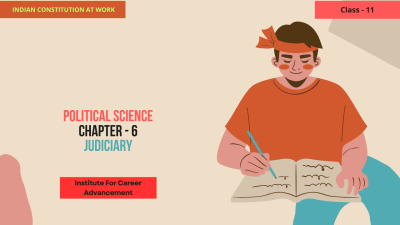Judiciary - Class 11

₹299
Judiciary is a Class 11 chapter that likely explores the functions, powers, and structure of the judicial branch of government. It might delve into topics such as: The Judicial Branch: The role and importance of the judiciary in a democratic system. The Supreme Court: The structure, composition, and powers of the Supreme Court, including its role in interpreting the Constitution and protecting fundamental rights. The High Courts: The structure, composition, and powers of the high courts, including their jurisdiction and relationship with the Supreme Court. The Subordinate Courts: The structure, composition, and jurisdiction of subordinate courts, including district courts, sessions courts, and special courts. Judicial Review: The power of the judiciary to review the actions of the executive and legislative branches and declare them unconstitutional. Challenges and Issues: The challenges and issues faced by the judiciary, such as judicial delays, corruption, and the politicization of the judiciary. Overall, this chapter likely provides a comprehensive overview of the judicial branch of government, its functions, and its relationship with other branches of government. বিচার বিভাগ হল একাদশ শ্রেণীর একটি অধ্যায় যা সম্ভবত সরকারের বিচার বিভাগীয় শাখার কাজ, ক্ষমতা এবং কাঠামো অন্বেষণ করে। এটি নিম্নলিখিত বিষয়গুলি নিয়ে আলোচনা করতে পারেঃ বিচার বিভাগঃ গণতান্ত্রিক ব্যবস্থায় বিচার বিভাগের ভূমিকা ও গুরুত্ব। সুপ্রিম কোর্টঃ সংবিধানের ব্যাখ্যা এবং মৌলিক অধিকার রক্ষায় সুপ্রিম কোর্টের ভূমিকা সহ সুপ্রিম কোর্টের কাঠামো, গঠন এবং ক্ষমতা। উচ্চ আদালতঃ উচ্চ আদালতের কাঠামো, গঠন এবং ক্ষমতা, তাদের এখতিয়ার এবং সুপ্রিম কোর্টের সাথে সম্পর্ক সহ। অধস্তন আদালতঃ জেলা আদালত, দায়রা আদালত এবং বিশেষ আদালত সহ অধস্তন আদালতের কাঠামো, গঠন এবং এখতিয়ার। বিচার বিভাগীয় পর্যালোচনাঃ কার্যনির্বাহী ও আইন প্রণয়নকারী শাখার কার্যাবলী পর্যালোচনা করার এবং সেগুলিকে অসাংবিধানিক ঘোষণা করার বিচার বিভাগের ক্ষমতা। চ্যালেঞ্জ ও সমস্যাঃ বিচার বিভাগের চ্যালেঞ্জ ও সমস্যা, যেমন বিচারিক বিলম্ব, দুর্নীতি এবং বিচার বিভাগের রাজনীতিকরণ। সামগ্রিকভাবে, এই অধ্যায়টি সম্ভবত সরকারের বিচার বিভাগীয় শাখা, এর কার্যকারিতা এবং সরকারের অন্যান্য শাখার সাথে এর সম্পর্কের একটি বিস্তৃত বিবরণ প্রদান করে।
Learn more
 0
0 